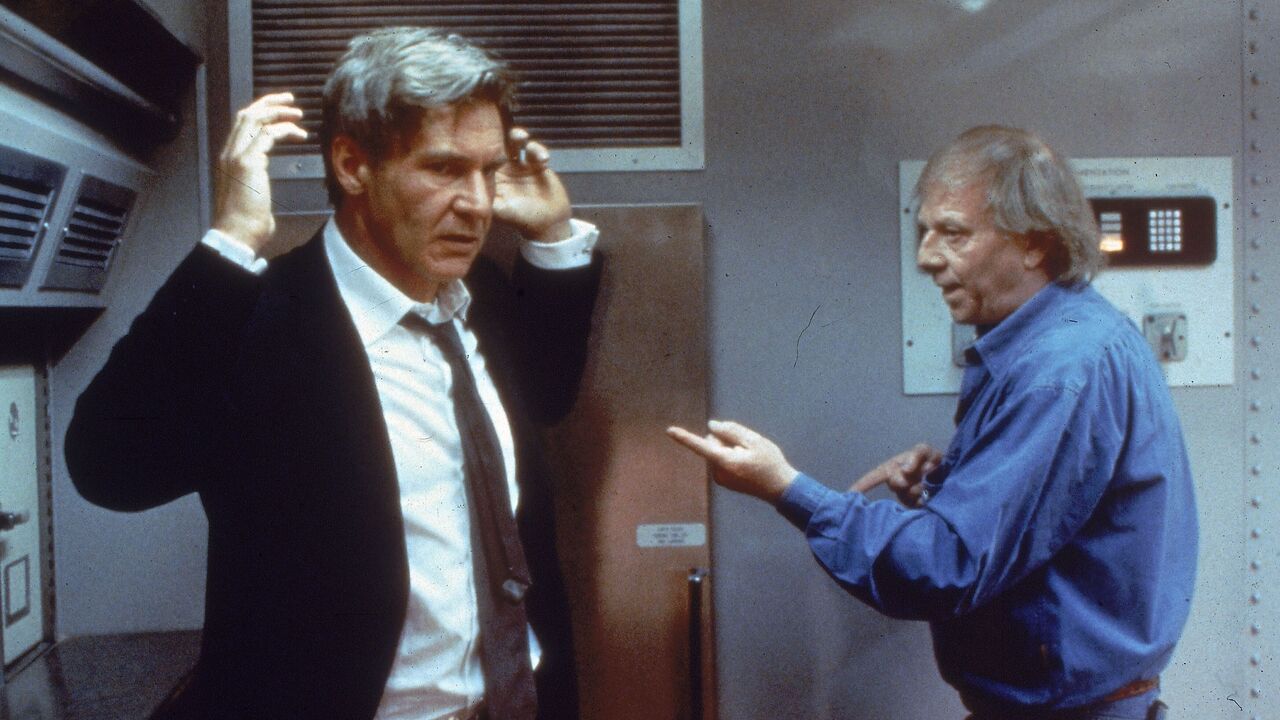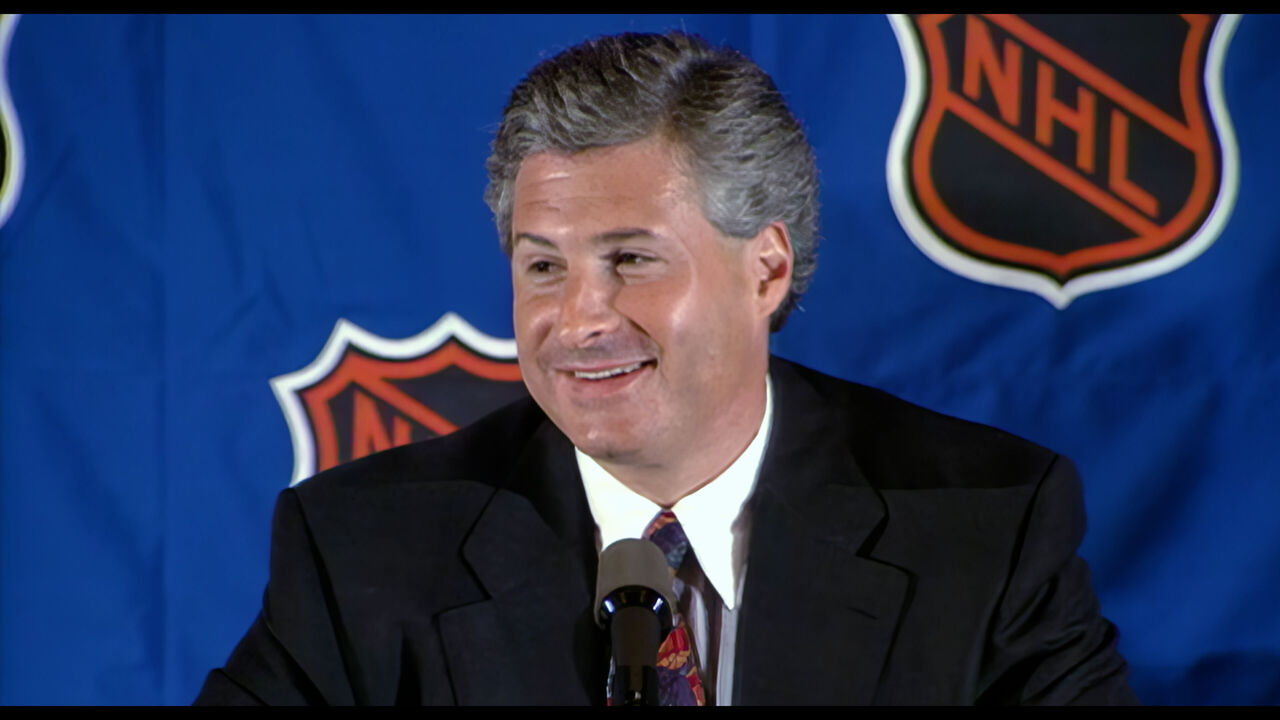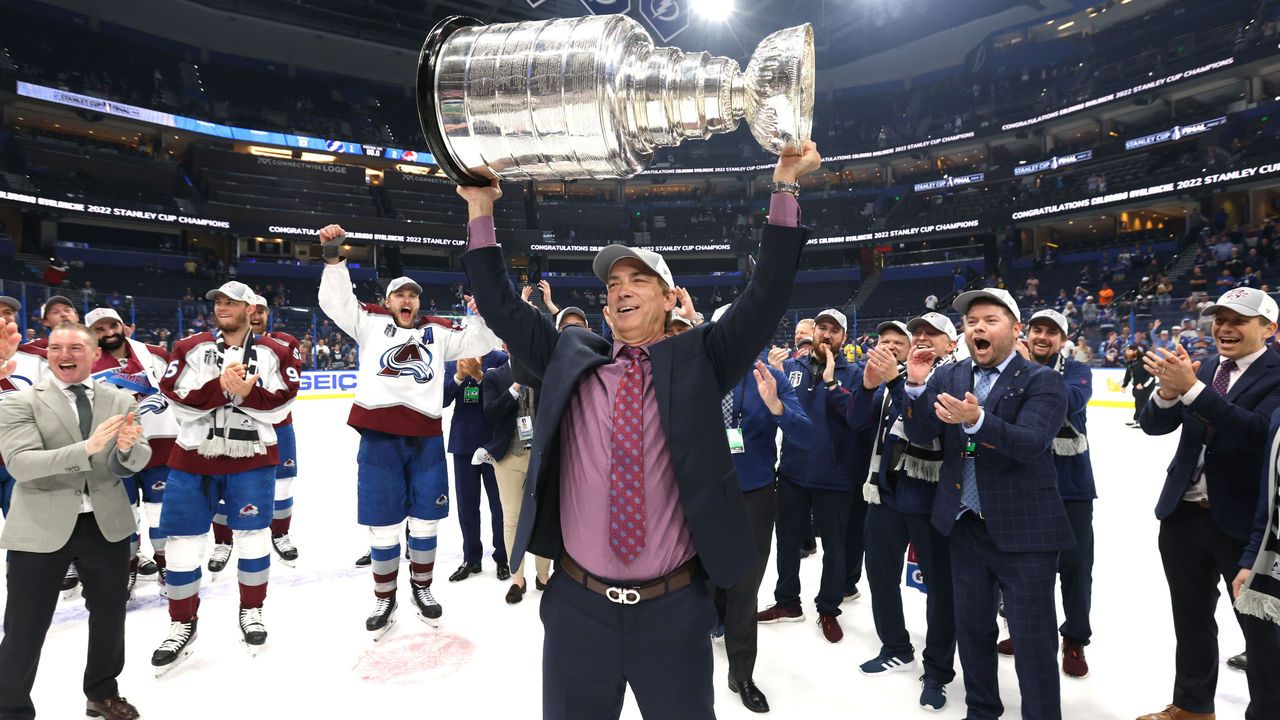Revisiting Harrison Ford's unlikely role in keeping Joe Sakic in Colorado
It was the summer of 1997 and Day 1 of NHL free agency was one minute away from closing. Charlie Lyons, then chairman and CEO of the Colorado Avalanche, was looking forward to a bike trip in the Rockies with his childhood friends while basking in the success of his new side gig as a film producer. His rookie film, "Air Force One" starring Harrison Ford, opened 10 days earlier and sat atop the box office. Not too bad a summer for a guy who spent the preceding offseason celebrating a Stanley Cup victory with the Avalanche.
That's when the call came in.
"Have you heard?" Denver Post sports columnist Mark Kiszla asked. "The New York Rangers just offered Joe Sakic $21 million with $15 million up-front. What have you got to say about that?"
Lyons hadn't heard, and he didn't know what to say.
"There's a lot of things you can do in business, but one thing you can't make up is money in the bank. We did not have that money in the bank," Lyons says in the NHL's new documentary, "Saving Sakic," which revisits the attempt to lure the Avs captain with a restricted free-agent offer sheet.
"I went on a journey to try and find out what happened because no one on the internet and none of the articles I was reading really nailed it, there was a lot of conjecture," said documentary director Jay Nelson, who spent two years tracing the story from the perspective of both the Avalanche and Rangers, who were themselves reacting to the loss of captain Mark Messier to the Vancouver Canucks.
"Making the movie was a surprise the whole way. This was a different time in the NHL," Nelson said. Prime Video members in Canada can access the film starting Tuesday, and it'll be available to ESPN+ subscribers in the U.S. on Wednesday.
In 1997, Ascent Entertainment, the parent company of the Avalanche and the NBA's Denver Nuggets, didn't have the cash on hand to match the Rangers' offer. With only seven days to come up with the money in the pre-salary cap era, Lyons' own hero's quest to keep the Avalanche's biggest star has become the stuff of NHL legend.
As it would happen, Lyons found help from an unexpected source: Hollywood. Beacon Pictures was a sibling company in Ascent's portfolio and one of the producers of "Air Force One." Drawing on business lessons he learned creating the film with Ford, Lyons negotiated a deal that kept Sakic in Denver while also getting a new arena built. Eventually, even Sakic would thank Ford for the roundabout assist.

With Sakic safely tucked away, Colorado went to four conference finals over the next six seasons and won the Stanley Cup again in 2001.
theScore interviewed Lyons - who continues to produce films after Ascent sold the teams in 2000 - about that summer and how he put together the deal to keep Sakic in Colorado.
theScore: When you get bombshell news about the Rangers offering Sakic a $21-million contract, what's your reaction? Was it a moment where your stomach dropped? Or did it bring out your competitive side?
Lyons: The first reaction is you've walked into a punch. And it was a double punch because it didn't come from within. It was Mark Kiszla calling, who was a terrific journalist and seemed to be ahead of every story. He would have been a great Sherlock Holmes, frankly. He just laid me out and said, "What do you have to say about that?"
First I heard of it. I was done for the summer. We had successfully released the film, and I was catching my breath. So, yeah, that's a sucker punch. No question.
What is it about Sakic that made it imperative to keep him in Denver?
We defined a star as not only somebody who performs, but somebody who fits in, and somebody who was an ingredient and the chemistry of the family. Joe was the leader of the team - he was the moral centerpiece.
I'd had a bad experience where a person who I have become very close to in life, Dikembe Mutombo, was poached by the Atlanta Hawks from the Nuggets. To this day, I consider it to be the worst business failure that I was involved with - to lose a player of that caliber, who was so great in the locker room, who was such a fabulous representation of the organization, the community. Joe had all of those qualities. So, you feel like you're losing a son in a way. It gets right to the core of what a team is. There was a real desire to prevent it from happening.
It was overwhelming. You feel so much responsibility for everybody else, and you feel enormously deficient that something like this could even happen.

In the face of that chaos, how did you snap into action?
You have to deal with what is on your plate. So you take a step back: the money's not in the bank, if everything stays the same he's going to go.
You think, even though you have a hit motion picture, that's your other company. Those resources are intended to make films. But what "Air Force One" did is - when you have something that's that successful, it gives you confidence that you can solve problems, and you can get things done.
Then, you just catch your breath for a moment and say, 'OK, what's possible here?' There were three moving pieces. One is: We've got to be able to say to the community, and say to Joe and say to the world, that there's going to be a state-of-the-art facility to play in. That's also a statement for the fans.
The second part was: Maybe there's somebody in town that might come in and become a small partner right now because it appeals to them. That was Liberty Media. They have great civic pride, so they were happy to come to the rescue.
And the third was the expiring Fox (national TV) agreement. Those are big television rights for teams. They are very, very important. So to get a little bit of an advance and cement that - don't waste a crisis.
At the end of the week, when everything was secured and you knew Sakic was staying, you must have felt great about pulling it all together.
I felt good. But I also felt that, wow, we're pretty vulnerable. This can't go on, there are no more new arenas or sales or partial sales. The idea that you'd have to do things that affect the future in order to conduct business today was a sobering aspect. We got through it and we got a lot of things done, and that's really great. But there was also that sobering reality that we may be too small for what is going to happen in this business.
I love Denver, I feel an enormous personal connection to the people. I love Colorado. As a matter of fact, I live in Colorado. I have to work in Los Angeles and am on sets all over the place. But my domicile is Colorado. So I have huge civic pride and I love the city. So it's more personal, you know what I mean? It's the human connections that are so great.
What do you think about the way the NHL has evolved since the 1990s when stars were at greater risk of being poached?
Gary Bettman has done such a terrific job. I don't think he gets the credit he deserves. He came into a very established culture. I got to know him when I was involved with the NBA. He was great at what he did there. So I had no doubt when he got over to the NHL, he was gonna bring all that energy.
Here's what's changed, I think, for the better. When he got there, you could see the energy and the upswing in the development of the league. But what you're seeing with this particular incident, and ironically with myself and my company, was the days were over for small entrepreneurs trying to do this. You've seen the stories come out about Jerry Buss that everybody thought, 'What was behind the curtain on the Lakers?' Well, they didn't have the financial resources. That's sort of been taken care of in Denver.
The teams in Denver are so much better off now than they were when they were run by people like us. Because the resources are so deep, no one would ever contemplate trying to steal somebody with resources as the weapon. That would be just idiotic. This was an utter act of madness, but totally understandable, given what David (Checketts, then president and CEO of Madison Square Garden) was going through in New York. He lost a guy like Messier. He was just getting clobbered there.
My situation - it was a publicly traded company. There was the tension that sports is not a quarter-to-quarter business and public companies are. So, you have this awful disconnect. Investors are looking for short-term rewards and short-term profits. It's the whole tension of: are these companies better public or private? I don't think there's any question they're better private, frankly. At the end of the day, the economic motivations are very different for a high net-worth family than they are for a publicly traded company and people in those management roles.
And then, plus the fact that all the changes made in hockey afterwards, like putting a cap in.

Has Sakic ever thanked Harrison Ford for his role in keeping him in Denver?
Yeah, he has. He hasn't had the chance to meet him personally because Harrison's actually the busiest he's ever been in his life now. But he did thank him, he was hysterical.
Jolene Latimer is a features writer at theScore.
HEADLINES
- Schaefer becomes 4th rookie D-man ever with 20-goal season
- Golden Knights' Stone suffers upper-body injury vs. Penguins
- Kings fire Jim Hiller, name D.J. Smith interim coach
- NHL Awards Watch: Races heating up as we enter stretch run
- Buchnevich scores late in 3rd period to help Blues end 10-game road skid